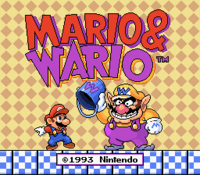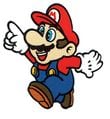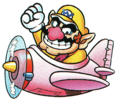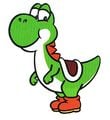Mario & Wario: Difference between revisions
(CERO didn't rate this) |
|||
| (219 intermediate revisions by more than 100 users not shown) | |||
| Line 1: | Line 1: | ||
{{ | {{italic title}} | ||
{{ | {{distinguish|Mario vs. Wario}} | ||
{{ | {{game infobox | ||
|image=[[ | |image=[[File:MnW cover art.jpg|250px]] | ||
|developer= | |developer=[[Game Freak]] | ||
|publisher= | |publisher=[[Nintendo]] | ||
|designer= | |designer=Nintendo | ||
| | |release={{flag list|Japan|August 27, 1993}} | ||
|genre=Puzzle | |languages={{languages|en_us=y}} | ||
|genre=[[Genre#Puzzle games|Puzzle]], [[Genre#Platform games|platformer]] | |||
|modes=Single player | |modes=Single player | ||
| | |platforms=[[Super Nintendo Entertainment System#Super Famicom|Super Famicom]] | ||
| | |format={{format|snes=1}} | ||
| | |input={{input|snesmouse=1}} | ||
| | |serials=SHVC-WE | ||
| | |||
}} | }} | ||
'''''Mario & Wario''''' is a [[Genre#Puzzle games|puzzle]]-[[Genre#Platform games|platform]] game released for the [[Super Nintendo Entertainment System#Super Famicom|Super Famicom]] in 1993. It was designed by Satoshi Tajiri and developed by [[Game Freak]]. It is one of the few games of the [[Super Mario (franchise)|''Super Mario'' franchise]] to utilize the [[Super Nintendo Entertainment System#Super NES Mouse|Super Famicom Mouse]] accessory. | |||
'''''Mario & Wario''''' is a | |||
== | The game was initially planned to be localized for the North American market (as shown by it being previewed in the September 1993 issue of ''[[Nintendo Power]]'' and a Canadian ad for a {{wp|Kellogg's}} contest,<ref>{{cite|author=G, Evan|url=https://www.snescentral.com/article.php?id=0921|title=''Mario & Wario''|publisher=SNES Central|accessdate=May 27, 2024|language=en-ca}}</ref> which [[:File:Mario&Wario Western Boxart.jpg|featured a tentative box art]]), but ended up being a Japan-exclusive title. Despite this, the game itself contains no written Japanese whatsoever; it is entirely in English. ''Mario & Wario'' had also been featured in magazines from the UK, Germany, and Brazil. Most prominently, it was featured on the front cover of the November 1993 issue of VideoGame Magazine in Brazil with a full feature, which indicated that a release was near.<ref>{{cite|url=https://www.sm128c.com/mario-and-wario-western-release-0176|title=''Mario & Wario'': Nearly released in Americas and Europe|language=en|publisher=Super Mario 128 Central|accessdate=May 27, 2024|date=April 27, 2020}}</ref> | ||
< | |||
== | ==Story== | ||
=== | '''Translated from the instruction booklet'''<ref>{{cite|title=''Mario & Wario'' instruction booklet|date=1993|language=ja|publisher=Nintendo|page=[[:File:WarioToMonogatari.png|2]]}}</ref> | ||
''This is [[Yōsei no Mori]]. Within the forest's depths lives a fairy, and those who behold it find happiness, as the tale goes. One day, [[Mario]] sought the fabled fairy by coming to the forest. [[Princess Peach|Peach]], [[Yoshi]] and [[Luigi]] were together......or should have been, but alas, Luigi's visage was unseen. Mario's group of three had decided to look for lost little Luigi.'' | |||
''Then, the sky was overcome with a suspicious engine's sound. What was that? It was [[Wario]] riding his personal plane, the [[Bulldog]], and he threw a [[bucket]] from the sky.'' | |||
''"Here you go!"'' | |||
''Uh oh, the bucket landed right over Mario's head.'' | |||
''"Uwagh, I can't see in this thing!"'' | |||
''Watching was the forest's fairy, [[Wanda]]. She somehow wanted to help, but the small fairy did not have the ability to remove the bucket. Thus, Wanda decided to use her [[magic wand]] on Mario to send signals, guiding him to Luigi......'' | |||
=== | ==Gameplay== | ||
[[File:Mario_And_Wario_Title_Screen.png|thumb|left|Title screen]] | |||
The main gameplay involves guiding [[Princess Peach]], [[Mario]], or [[Yoshi]] to the goal, where [[Luigi]] awaits. The player can select one of the original eight stages at the start. Once they are cleared, the final stages become available. At the beginning of every stage except EXTRA, [[Wario]] drops a random item on the character's head, making them unable to see where they are going. | |||
The player uses the Super Famicom Mouse to control [[Wanda]] the sprite and alter the environment to make it safe for the character, making it somewhat similar to the [[Mario vs. Donkey Kong (series)|''Mario vs. Donkey Kong'' series]]. The character will walk left and right on their own, so the obstacles must be manipulated accordingly to allow the character to safely navigate through the level. There is a time limit for each level, and bonus points are given for any excess time. Each character has a set speed; Peach is slow, Mario is medium, and Yoshi is fast. At the end of every stage, there is a bonus mini-game where Wanda can whack Wario with a [[hammer]]. Every time the player hits Wario on his plane, the player will earn one coin. After forty hits, the plane will malfunction in Wario's face, but he will also flee if enough time has passed. | |||
{{br|left}} | |||
===Level 10: Wario's | ==Characters== | ||
Playable once | ===Main characters=== | ||
{{content description | |||
|image1=[[File:WandaM&W.png]] | |||
|name1=[[Wanda]] | |||
|description1=The main protagonist, who must guide each character to the end of each level. | |||
|image2=[[File:MWPrincessPeachSprite.png]] | |||
|name2=[[Princess Peach]] | |||
|description2=One of the characters who must be guided to the end of each level. | |||
|image3=[[File:Mario MarioWario.png]] | |||
|name3=[[Mario]] | |||
|description3=One of the characters who must be guided to the end of each level. | |||
|image4=[[File:MWYoshiSprite.png]] | |||
|name4=[[Yoshi]] | |||
|description4=One of the characters who must be guided to the end of each level. | |||
|image5=[[File:MWLuigiSprite.png]] | |||
|name5=[[Luigi]] | |||
|description5=The character who waits at the goal at the end of each level. | |||
|image6=[[File:MWWarioSprite.png]] | |||
|name6=[[Wario]] | |||
|description6=The main antagonist, who is fought after every world in the game. | |||
}} | |||
===Enemy characters=== | |||
{{content description | |||
|image1=[[File:Dodoriguez Jr. Sprite.png]] | |||
|name1=[[Dodorigesu Jr.]] | |||
|description1=These immobile [[Pidgit]]s can be defeated by simply clicking on them. | |||
|image2=[[File:Guriguri Sprite.png]] | |||
|name2=[[Guriguri]] | |||
|description2=A [[fireball]] which usually moves along walls and floors. | |||
|image3=[[File:Komorin Sprite.png]] | |||
|name3=[[Komorin]] | |||
|description3=Tricky bat enemies that often group together in packs of four. | |||
|image4=[[File:Tsubon Sprite.png]] | |||
|name4=[[Tsubōn]] | |||
|description4=A pot-shaped enemy with a skull mark that can cling onto walls and breath fire. | |||
|image5=[[File:Unibo Sprite Blue.png]][[File:Unibo Sprite Yellow.png]] | |||
|name5=[[Unibo]] | |||
|description5=Spiky enemies which resemble [[Urchin]]s and appear in LEVEL 6 and LEVEL 9. They come in blue variations that move up and down and yellow variations that move left and right. | |||
}} | |||
==Stages== | |||
{|width=100% cellspacing=0 border=2 cellpadding=3 style="border-collapse:collapse;" | |||
|width=20% align="center" style="background:#8b4513"|[[File:M&W Level 1-1 Map.png|250px]] | |||
|LEVEL 1<br>'''[[Yōsei no Mori]]'''<br>The fairy's forest is the easiest stage of the ten, and a tutorial for the rest of the game. The world map for each course fits on one screen, making them the smallest of the game. One Guriguri is introduced in the last course. <br>'''Levels'''<br>[[Level 1-1 (Mario & Wario)|Level 1-1]] • [[Level 1-2 (Mario & Wario)|Level 1-2]] • [[Level 1-3 (Mario & Wario)|Level 1-3]] • [[Level 1-4 (Mario & Wario)|Level 1-4]] • [[Level 1-5 (Mario & Wario)|Level 1-5]] • [[Level 1-6 (Mario & Wario)|Level 1-6]] • [[Level 1-7 (Mario & Wario)|Level 1-7]] • [[Level 1-8 (Mario & Wario)|Level 1-8]] • [[Level 1-9]] • [[Level 1-10]] | |||
|- | |||
|width=20% align="center" style="background:#00ff7f"|[[File:M&W Level 2-2 Map.png|250px]] | |||
|LEVEL 2<br>'''[[Yosu Ko]]'''<br>A [[world]] set next to a relaxing lake where [[Yoshi (species)|Yoshis]] have holiday. It is still a standard stage, but slightly harder than the first. <br>'''Levels'''<br>[[Level 2-1 (Mario & Wario)|Level 2-1]] • [[Level 2-2 (Mario & Wario)|Level 2-2]] • [[Level 2-3 (Mario & Wario)|Level 2-3]] • [[Level 2-4 (Mario & Wario)|Level 2-4]] • [[Level 2-5 (Mario & Wario)|Level 2-5]] • [[Level 2-6 (Mario & Wario)|Level 2-6]] • [[Level 2-7 (Mario & Wario)|Level 2-7]] • [[Level 2-8 (Mario & Wario)|Level 2-8]] • [[Level 2-9]] • [[Level 2-10]] | |||
|- | |||
|width=20% align="center" style="background:#87cefa"|[[File:M&W Level 3-3 Map.png|250px]] | |||
|LEVEL 3<br>'''[[Kumotori Yama]]'''<br>A mountain region. Timer Blocks are frequent, so sitting around is dangerous. <br>'''Levels'''<br>[[Level 3-1 (Mario & Wario)|Level 3-1]] • [[Level 3-2 (Mario & Wario)|Level 3-2]] • [[Level 3-3 (Mario & Wario)|Level 3-3]] • [[Level 3-4 (Mario & Wario)|Level 3-4]] • [[Level 3-5 (Mario & Wario)|Level 3-5]] • [[Level 3-6 (Mario & Wario)|Level 3-6]] • [[Level 3-7 (Mario & Wario)|Level 3-7]] • [[Level 3-8 (Mario & Wario)|Level 3-8]] • [[Level 3-9]] • [[Level 3-10]] | |||
|- | |||
|width=20% align="center" style="background:#191970"|[[File:M&W Level 4-4 Map.png|250px]] | |||
|LEVEL 4<br>'''[[Kōri no Dōkutsu]]'''<br>An icy cavern with many frozen features. Nebaneba Blocks appear towards the end. <br>'''Levels'''<br>[[Level 4-1 (Mario & Wario)|Level 4-1]] • [[Level 4-2 (Mario & Wario)|Level 4-2]] • [[Level 4-3 (Mario & Wario)|Level 4-3]] • [[Level 4-4 (Mario & Wario)|Level 4-4]] • [[Level 4-5 (Mario & Wario)|Level 4-5]] • [[Level 4-6 (Mario & Wario)|Level 4-6]] • [[Level 4-7 (Mario & Wario)|Level 4-7]] • [[Level 4-8 (Mario & Wario)|Level 4-8]] • [[Level 4-9]] • [[Level 4-10]] | |||
|- | |||
|width=20% align="center" style="background:#b22222"|[[File:M&W Level 5-5 Map.png|250px]] | |||
|LEVEL 5<br>'''[[Honō no Dōkutsu]]'''<br>A subterranean cave filled with magma. Pot-shaped enemies called Tsubōn are introduced here, and will breathe fire at the player. <br>'''Levels'''<br>[[Level 5-1 (Mario & Wario)|Level 5-1]] • [[Level 5-2 (Mario & Wario)|Level 5-2]] • [[Level 5-3 (Mario & Wario)|Level 5-3]] • [[Level 5-4 (Mario & Wario)|Level 5-4]] • [[Level 5-5 (Mario & Wario)|Level 5-5]] • [[Level 5-6 (Mario & Wario)|Level 5-6]] • [[Level 5-7 (Mario & Wario)|Level 5-7]] • [[Level 5-8 (Mario & Wario)|Level 5-8]] • [[Level 5-9]] • [[Level 5-10]] | |||
|- | |||
|width=20% align="center" style="background:#96ded1"|[[File:M&W Level 6-6 Map.png|250px]] | |||
|LEVEL 6<br>'''[[Pukupuku Kai]]'''<br>A large body of water infested with Unibo. Switch Blocks are frequent. <br>'''Levels'''<br>[[Level 6-1 (Mario & Wario)|Level 6-1]] • [[Level 6-2 (Mario & Wario)|Level 6-2]] • [[Level 6-3 (Mario & Wario)|Level 6-3]] • [[Level 6-4 (Mario & Wario)|Level 6-4]] • [[Level 6-5 (Mario & Wario)|Level 6-5]] • [[Level 6-6 (Mario & Wario)|Level 6-6]] • [[Level 6-7 (Mario & Wario)|Level 6-7]] • [[Level 6-8 (Mario & Wario)|Level 6-8]] • [[Level 6-9]] • [[Level 6-10]] | |||
|- | |||
|width=20% align="center" style="background:#f5fffa"|[[File:M&W Level 7-7 Map.png|250px]] | |||
|LEVEL 7<br>'''[[Balloon Bridge]]'''<br>An area in the sky. Fūsen Blocks are frequent. <br>'''Levels'''<br>[[Level 7-1]] • [[Level 7-2]] • [[Level 7-3]] • [[Level 7-4]] • [[Level 7-5]] • [[Level 7-6]] • [[Level 7-7]] • [[Level 7-8]] • [[Level 7-9]] • [[Level 7-10]] | |||
|- | |||
|width=20% align="center" style="background:#987654"|[[File:M&W Level 8-8 Map.png|250px]] | |||
|LEVEL 8<br>'''[[Karakara Sabaku]]'''<br>A vast desert location. Guriguri are frequent. <br>'''Levels'''<br>[[Level 8-1]] • [[Level 8-2]] • [[Level 8-3]] • [[Level 8-4]] • [[Level 8-5]] • [[Level 8-6]] • [[Level 8-7]] • [[Level 8-8]] • [[Level 8-9]] • [[Level 8-10]] | |||
|- | |||
|width=20% align="center" style="background:#ffc0cb"|[[File:M&W Level 9-9 Map.png|250px]] | |||
|LEVEL 9<br>'''[[Wario no Niwa]]'''<br>Wario's personal garden, which is playable once LEVEL 8 is cleared. <br>'''Levels'''<br>[[Level 9-1]] • [[Level 9-2]] • [[Level 9-3]] • [[Level 9-4]] • [[Level 9-5]] • [[Level 9-6]] • [[Level 9-7]] • [[Level 9-8]] • [[Level 9-9]] • [[Level 9-10]] | |||
|- | |||
|width=20% align="center" style="background:#9370db"|[[File:M&W Level 10-10 Map.png|250px]] | |||
|LEVEL 10<br>'''[[Wario Tei]]'''<br>A big, untidy residence. Playable once LEVEL 9 is cleared. <br>'''Levels'''<br>[[Level 10-1]] • [[Level 10-2]] • [[Level 10-3]] • [[Level 10-4]] • [[Level 10-5]] • [[Level 10-6]] • [[Level 10-7]] • [[Level 10-8]] • [[Level 10-9]] • [[Level 10-10]] | |||
|- | |||
|width=20% align="center" style="background:#1d2951"|[[File:M&W Level EX-1 Map.png|250px]] | |||
|EXTRA LEVEL<br>'''[[EXTRA]]'''<br>An extra stage revealed after clearing LEVEL 10. It is a very difficult world. <br>'''Levels'''<br>[[Level EX-1]] • [[Level EX-2]] • [[Level EX-3]] • [[Level EX-4]] • [[Level EX-5]] • [[Level EX-6]] • [[Level EX-7]] • [[Level EX-8]] • [[Level EX-9]] • [[Level EX-10]] | |||
|} | |||
==Items and obstacles== | |||
===Blocks=== | |||
{{content description | |||
|image1=[[File:MW-Coin Panel Sprite.PNG]] | |||
|name1=[[Coin Block]] | |||
|description1=Wanda can hit these to collect [[coin]]s. One hundred coins will give the player an [[extra life]]. | |||
|image2=[[File:M&WElevatorSprite.png]] | |||
|name2=[[Elevator (Mario & Wario)|Elevator]] | |||
|description2=Once on these lifts, the character must wait until they can move again. | |||
|image3=[[File:BlockPanel.gif]] | |||
|name3=[[Flip-Flop Block]] | |||
|description3=One of the most basic [[block]]s, they can be made solid or passable with the flick of a click. | |||
|image4=[[File:BalloonBlock.png]] | |||
|name4=[[Fūsen Block]] | |||
|description4=Balloons which expand and inflate from time to time. | |||
|image5=[[File:HibiBlock.png]] | |||
|name5=[[Rock Block]] | |||
|description5=These cracked square walls can be hit to be destroyed. | |||
|image6=[[File:M&WJumpBlocks.png]] | |||
|name6=[[Jump Block (Mario & Wario)|Jump Block]] | |||
|description6=Jump Blocks look like [[springboard]]s, and are usually seen grounded on flooring rather than suspended in the air as in other games. | |||
|image7=[[File:StickyBlock.png]] | |||
|name7=[[Nebaneba Block]] | |||
|description7=These blocks are sticky and trap friend and foe alike. | |||
|image8=[[File:M&WSwitchBlocks.png]] | |||
|name8=[[Switch Block (Mario & Wario)|Switch Block]] | |||
|description8=These switch from solid and red to blue and intangible. | |||
|image9=[[File:M&WTimerBlocks.png]] | |||
|name9=[[Timer Block]] | |||
|description9=Hitting these blocks will make them solid for a short time. Wanda must know when and how to use them. | |||
|image10=[[File:M&WTogeBlocks.png]] | |||
|name10=[[Spike Trap|Toge Block]] | |||
|description10=These pointy obstacles take up the full space of a block. They can face four directions. | |||
}} | |||
===Items=== | |||
{{content description | |||
|image1=[[File:M&W 1-Up Mushroom.png]] | |||
|name1=[[1-Up Mushroom]] | |||
|description1=As the name suggests, these green mushrooms give the player [[Extra life|extra lives]]. | |||
|image2=[[File:M&W Coin.png]] | |||
|name2=[[Coin]] | |||
|description2=Coins add points to the player's score. Collecting one hundred coins gives the player an extra life. | |||
|image3=[[File:M&W Star.png]] | |||
|name3=[[Star (Mario & Wario)|Star]] | |||
|description3=The most common item in the game. Collect four of them in a level to earn an [[extra life]]. | |||
|image4=[[File:MushroomM&W.png]] | |||
|name4=[[Time Kinoko]] | |||
|description4=Standard mushrooms that add to the [[Time Limit|Time Gauge]]. There are not many of these in the game. | |||
}} | |||
==Development== | |||
After Game Freak's successful collaboration with Nintendo on ''[[Yoshi (game)|Yoshi]]'', Nintendo president [[Hiroshi Yamauchi]] requested Game Freak to develop a new game that would make use of the [[Super Scope]] accessory.<ref name="Akihito Tomisawa's X">{{cite|url=x.com/hitoqui_ponko/status/1632780947337904128|title=そこに、『マリオとワリオ』なんてさ、最初は山内社長から「{{lang|ja|今}}度うちが出すスーパースコープ用のゲームを作れ!」って指令から始まったプロジェクトだからね。で、田尻社長とおれが延々アイデアを練って、社長がある日「グレムリンだ!」ってひらめいて、→|date=March 6, 2023|publisher=X|language=ja|accessdate=April 7, 2023}}</ref> As ''Yoshi'' was a big commercial success but was not a self-owned property, there was a desire internally at Game Freak to develop titles using the company's own characters.<ref>{{cite|url=x.com/hitoqui_ponko/status/1632779638501179392|title=前段として『ヨッシーのたまご』があって、あれは300万本のスマッシュヒットになったけど、自社のキャラではない。その後、元はオリジナルとして作っていたゲームが『マリオとワリオ』になり、大ヒットもした。そこに唯一ゲームフリークのオリジナルキャラである「ワンダ」ちゃんがいた。→|date=March 6, 2023|language=ja|publisher=X|accessdate=April 7, 2023}}</ref><ref>{{cite|language=ja|url=x.com/hitoqui_ponko/status/1632780119763992576|title=これで、やっぱり「うちのオリジナルキャラが欲しいよねえ」という気分が社内に強くあった。それがその後の『ポケモン』を完全オリキャラで、という方向性に影響したのは間違いない。|date=March 6, 2023|publisher=X|accessdate=April 7, 2023}}</ref> After brainstorming with employee Akihito Tomisawa, Game Freak president Satori Tajiri settled on the idea of making a horror-themed game inspired by ''{{wp|Gremlins}}''.<ref name="Akihito Tomisawa's X"/> | |||
The original concept was that the player would attempt to capture a monster living inside a "western-style building" by firing a net with the Super Scope and capture it with a trigger. Though a prototype was produced and the project was coming along smoothly, it had become obvious the Super Scope was a commercial failure, so the game was retooled to use the more recent Super NES Mouse.<ref>{{cite|url=x.com/hitoqui_ponko/status/1632781588391141376|title=洋館に住み着いた謎のモンスターをバズーカで網を発射してキャプチャーし、トリガーで捕獲するっていうゲームにした。試作もしてけっこういい感じになってきたんだけど、バズーカが全然売れないので、任天堂はマウスを出してきた。→|date=March 6, 2023|language=ja|publisher=X|accessdate=April 7, 2023}}</ref> The concept shifted to guiding a character inside a maze using the mouse.<ref>{{cite|url=x.com/hitoqui_ponko/status/1632782301859045376|title=それで、グレムリン系のゲームをマウス(ポインティングデバイスという点では構造は一緒)向けに改良する過程で、迷路内を動くキャラをマウスで誘導するゲームになっていった。|date=March 6, 2023|language=ja|publisher=X|accessdate=April 7, 2023}}</ref> Eventually, Nintendo suggested to include Nintendo characters in the game, a suggestion Game Freak agreed to as they thought it would make the game sell better. However, at the last minute, Game Freak requested to keep a character created for the earlier versions of the game, Wanda (designed by artist [[bulbapedia:Ken Sugimori|Ken Sugimori]]).<ref>{{cite|url=x.com/hitoqui_ponko/status/1632782982758166528|title=そこに、任天堂サイドから「どうせなら任天堂のキャラを載せようや」という提案があり、僕らもその方がどう考えても売れるので承諾してマリオとワリオになった。でもギリギリでワンダちゃん(杉森建のオリジナルキャラ)を残してもらった.|date=March 6, 2023|publisher=X|language=ja|accessdate=April 7, 2023}}</ref> | |||
== | ==References in other media== | ||
*''[[bulbapedia:Pokémon Red and Blue Versions|Pokémon Red and Blue]]'': In Copycat's house, the protagonist can interact with a Super Nintendo Entertainment System connected to a TV, which is described as displaying "a game with Mario wearing a bucket on his head." Both ''Mario & Wario'' and ''Pokémon Red'' and ''Blue'' were developed by Game Freak. [[bulbapedia:Kanto Route 24|Route 24]] and [[bulbapedia:Kanto Route 25|Route 25]]'s theme sounds somewhat similar to the sky theme from ''Mario & Wario''. | |||
*''[[wikirby:Kirby Super Star|Kirby Super Star]]'' and ''[[wikirby:Kirby Super Star Ultra|Kirby Super Star Ultra]]'': One of the [[wikirby:Treasure|treasure]]s that can be obtained in the [[wikirby:Crystal (area)|Crystal]] area of the [[wikirby:The Great Cave Offensive|The Great Cave Offensive]] main game is a Bucket almost identical to the one in ''Mario & Wario''. However, the "M" in the Bucket is orange instead of purple. | |||
*''[[Mario and the Incredible Rescue]]'': In chapter 8, Wario attacks with buckets. | |||
*''[[Super Smash Bros. Melee]]'': The [[bucket]] Mario wore on his head appears as a [[Trophy (Super Smash Bros. series)|trophy]]. It mentions that "the bucket's M looks like a W when turned upside down". | |||
*''[[Mario & Luigi: Bowser's Inside Story]]'': One of [[Junker]]'s attacks is dropping a bucket on [[Mario]] or [[Luigi]]'s heads and they walk back and forth, using a similar animation to the ones in ''Mario & Wario''. | |||
*''[[Super Smash Bros. Ultimate]]'': [[Wanda]] appears as a spirit. | |||
==Staff== | |||
{{main|List of Mario & Wario staff}} | |||
== | ==Gallery== | ||
{{main-gallery}} | |||
<gallery> | |||
WarioToMario.jpg|[[Mario]] | |||
MnW Mario.jpg|Mario with a [[Bucket|bucket]] | |||
MnW-Wario.png|[[Wario]] | |||
Wanda.jpg|[[Wanda]] | |||
Mario & Wario - Princess Peach.png|[[Princess Peach]] | |||
WarioToYoshi.jpg|[[Yoshi]] | |||
</gallery> | |||
==Media== | |||
{{main-media}} | |||
{{media table | |||
|file1=MW Title.oga | |||
|title1=Title | |||
}} | |||
=== | ==Names in other languages== | ||
{{foreign names | |||
|Jap=マリオとワリオ | |||
|JapR=Mario to Wario | |||
|Jap2=マウス専用マリオとワリオ<ref>{{cite|url=www.nintendo.co.jp/n02/shvc/we/index.html|title=マウス専用マリオとワリオ|language=ja|publisher=Nintendo|accessdate=October 17, 2020}}</ref> | |||
|Jap2R=Mausu-sen'yō Mario to Wario | |||
|JapM=Mario & Wario | |||
|Jap2M=Mouse-Exclusive Mario & Wario; used in packaging and promotional materials. | |||
}} | |||
=== | ==References== | ||
{{NIWA|NWiki=1|StrategyWiki=1}} | |||
<references/> | |||
{{M&W}} | |||
{{Super Mario games}} | |||
{{Wario games}} | |||
{{SNES}} | {{SNES}} | ||
[[Category:Mario Games]] | [[de:Mario & Wario]] | ||
[[Category:Japan | [[it:Mario & Wario]] | ||
[[Category:Mario & Wario|*]] | |||
[[Category:Games]] | |||
[[Category:Japan-only games]] | |||
[[Category:1993 games]] | [[Category:1993 games]] | ||
[[Category:Puzzle games]] | |||
[[Category:Platforming games]] | |||
Latest revision as of 01:39, November 6, 2024
- Not to be confused with Mario vs. Wario.
| Mario & Wario | |
|---|---|
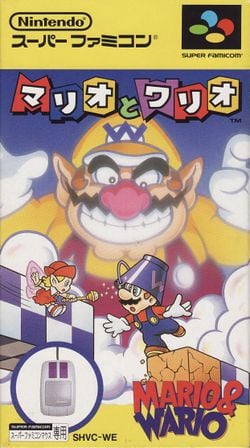 For alternate box art, see the game's gallery. | |
| Developer | Game Freak |
| Publisher | Nintendo |
| Platform(s) | Super Famicom |
| Release date | |
| Language(s) | English (United States) |
| Genre | Puzzle, platformer |
| Mode(s) | Single player |
| Format | Super NES: |
| Input | Super NES:
|
| Serial code(s) | SHVC-WE |
Mario & Wario is a puzzle-platform game released for the Super Famicom in 1993. It was designed by Satoshi Tajiri and developed by Game Freak. It is one of the few games of the Super Mario franchise to utilize the Super Famicom Mouse accessory.
The game was initially planned to be localized for the North American market (as shown by it being previewed in the September 1993 issue of Nintendo Power and a Canadian ad for a Kellogg's contest,[1] which featured a tentative box art), but ended up being a Japan-exclusive title. Despite this, the game itself contains no written Japanese whatsoever; it is entirely in English. Mario & Wario had also been featured in magazines from the UK, Germany, and Brazil. Most prominently, it was featured on the front cover of the November 1993 issue of VideoGame Magazine in Brazil with a full feature, which indicated that a release was near.[2]
Story[edit]
Translated from the instruction booklet[3]
This is Yōsei no Mori. Within the forest's depths lives a fairy, and those who behold it find happiness, as the tale goes. One day, Mario sought the fabled fairy by coming to the forest. Peach, Yoshi and Luigi were together......or should have been, but alas, Luigi's visage was unseen. Mario's group of three had decided to look for lost little Luigi.
Then, the sky was overcome with a suspicious engine's sound. What was that? It was Wario riding his personal plane, the Bulldog, and he threw a bucket from the sky.
"Here you go!"
Uh oh, the bucket landed right over Mario's head.
"Uwagh, I can't see in this thing!"
Watching was the forest's fairy, Wanda. She somehow wanted to help, but the small fairy did not have the ability to remove the bucket. Thus, Wanda decided to use her magic wand on Mario to send signals, guiding him to Luigi......
Gameplay[edit]
The main gameplay involves guiding Princess Peach, Mario, or Yoshi to the goal, where Luigi awaits. The player can select one of the original eight stages at the start. Once they are cleared, the final stages become available. At the beginning of every stage except EXTRA, Wario drops a random item on the character's head, making them unable to see where they are going.
The player uses the Super Famicom Mouse to control Wanda the sprite and alter the environment to make it safe for the character, making it somewhat similar to the Mario vs. Donkey Kong series. The character will walk left and right on their own, so the obstacles must be manipulated accordingly to allow the character to safely navigate through the level. There is a time limit for each level, and bonus points are given for any excess time. Each character has a set speed; Peach is slow, Mario is medium, and Yoshi is fast. At the end of every stage, there is a bonus mini-game where Wanda can whack Wario with a hammer. Every time the player hits Wario on his plane, the player will earn one coin. After forty hits, the plane will malfunction in Wario's face, but he will also flee if enough time has passed.
Characters[edit]
Main characters[edit]
| Image | Name | Description
|
|---|---|---|
| Wanda | The main protagonist, who must guide each character to the end of each level. | |
| Princess Peach | One of the characters who must be guided to the end of each level. | |
| Mario | One of the characters who must be guided to the end of each level. | |
| Yoshi | One of the characters who must be guided to the end of each level. | |
| Luigi | The character who waits at the goal at the end of each level. | |
| Wario | The main antagonist, who is fought after every world in the game. |
Enemy characters[edit]
| Image | Name | Description
|
|---|---|---|
| Dodorigesu Jr. | These immobile Pidgits can be defeated by simply clicking on them. | |
| Guriguri | A fireball which usually moves along walls and floors. | |
| Komorin | Tricky bat enemies that often group together in packs of four. | |
| Tsubōn | A pot-shaped enemy with a skull mark that can cling onto walls and breath fire. | |
| Unibo | Spiky enemies which resemble Urchins and appear in LEVEL 6 and LEVEL 9. They come in blue variations that move up and down and yellow variations that move left and right. |
Stages[edit]
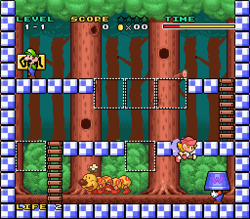
|
LEVEL 1 Yōsei no Mori The fairy's forest is the easiest stage of the ten, and a tutorial for the rest of the game. The world map for each course fits on one screen, making them the smallest of the game. One Guriguri is introduced in the last course. Levels Level 1-1 • Level 1-2 • Level 1-3 • Level 1-4 • Level 1-5 • Level 1-6 • Level 1-7 • Level 1-8 • Level 1-9 • Level 1-10 |
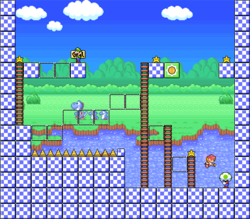
|
LEVEL 2 Yosu Ko A world set next to a relaxing lake where Yoshis have holiday. It is still a standard stage, but slightly harder than the first. Levels Level 2-1 • Level 2-2 • Level 2-3 • Level 2-4 • Level 2-5 • Level 2-6 • Level 2-7 • Level 2-8 • Level 2-9 • Level 2-10 |
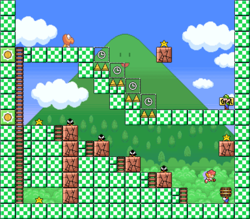
|
LEVEL 3 Kumotori Yama A mountain region. Timer Blocks are frequent, so sitting around is dangerous. Levels Level 3-1 • Level 3-2 • Level 3-3 • Level 3-4 • Level 3-5 • Level 3-6 • Level 3-7 • Level 3-8 • Level 3-9 • Level 3-10 |
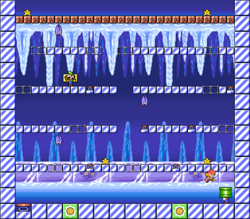
|
LEVEL 4 Kōri no Dōkutsu An icy cavern with many frozen features. Nebaneba Blocks appear towards the end. Levels Level 4-1 • Level 4-2 • Level 4-3 • Level 4-4 • Level 4-5 • Level 4-6 • Level 4-7 • Level 4-8 • Level 4-9 • Level 4-10 |
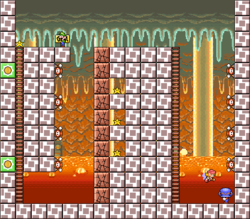
|
LEVEL 5 Honō no Dōkutsu A subterranean cave filled with magma. Pot-shaped enemies called Tsubōn are introduced here, and will breathe fire at the player. Levels Level 5-1 • Level 5-2 • Level 5-3 • Level 5-4 • Level 5-5 • Level 5-6 • Level 5-7 • Level 5-8 • Level 5-9 • Level 5-10 |
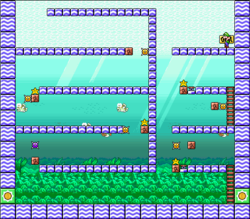
|
LEVEL 6 Pukupuku Kai A large body of water infested with Unibo. Switch Blocks are frequent. Levels Level 6-1 • Level 6-2 • Level 6-3 • Level 6-4 • Level 6-5 • Level 6-6 • Level 6-7 • Level 6-8 • Level 6-9 • Level 6-10 |
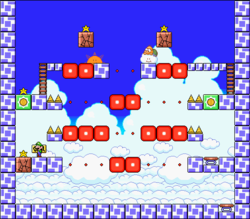
|
LEVEL 7 Balloon Bridge An area in the sky. Fūsen Blocks are frequent. Levels Level 7-1 • Level 7-2 • Level 7-3 • Level 7-4 • Level 7-5 • Level 7-6 • Level 7-7 • Level 7-8 • Level 7-9 • Level 7-10 |
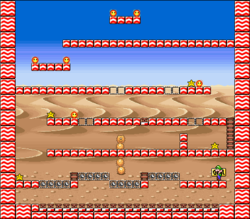
|
LEVEL 8 Karakara Sabaku A vast desert location. Guriguri are frequent. Levels Level 8-1 • Level 8-2 • Level 8-3 • Level 8-4 • Level 8-5 • Level 8-6 • Level 8-7 • Level 8-8 • Level 8-9 • Level 8-10 |
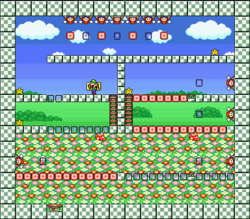
|
LEVEL 9 Wario no Niwa Wario's personal garden, which is playable once LEVEL 8 is cleared. Levels Level 9-1 • Level 9-2 • Level 9-3 • Level 9-4 • Level 9-5 • Level 9-6 • Level 9-7 • Level 9-8 • Level 9-9 • Level 9-10 |
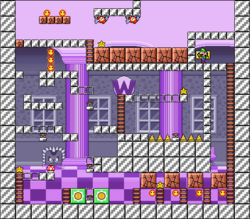
|
LEVEL 10 Wario Tei A big, untidy residence. Playable once LEVEL 9 is cleared. Levels Level 10-1 • Level 10-2 • Level 10-3 • Level 10-4 • Level 10-5 • Level 10-6 • Level 10-7 • Level 10-8 • Level 10-9 • Level 10-10 |
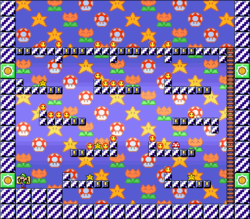
|
EXTRA LEVEL EXTRA An extra stage revealed after clearing LEVEL 10. It is a very difficult world. Levels Level EX-1 • Level EX-2 • Level EX-3 • Level EX-4 • Level EX-5 • Level EX-6 • Level EX-7 • Level EX-8 • Level EX-9 • Level EX-10 |
Items and obstacles[edit]
Blocks[edit]
| Image | Name | Description
|
|---|---|---|
| Coin Block | Wanda can hit these to collect coins. One hundred coins will give the player an extra life. | |
| Elevator | Once on these lifts, the character must wait until they can move again. | |
| Flip-Flop Block | One of the most basic blocks, they can be made solid or passable with the flick of a click. | |
| Fūsen Block | Balloons which expand and inflate from time to time. | |
| Rock Block | These cracked square walls can be hit to be destroyed. | |
| Jump Block | Jump Blocks look like springboards, and are usually seen grounded on flooring rather than suspended in the air as in other games. | |
| Nebaneba Block | These blocks are sticky and trap friend and foe alike. | |
| Switch Block | These switch from solid and red to blue and intangible. | |
| Timer Block | Hitting these blocks will make them solid for a short time. Wanda must know when and how to use them. | |
| Toge Block | These pointy obstacles take up the full space of a block. They can face four directions. |
Items[edit]
| Image | Name | Description
|
|---|---|---|
| 1-Up Mushroom | As the name suggests, these green mushrooms give the player extra lives. | |
| Coin | Coins add points to the player's score. Collecting one hundred coins gives the player an extra life. | |
| Star | The most common item in the game. Collect four of them in a level to earn an extra life. | |
| Time Kinoko | Standard mushrooms that add to the Time Gauge. There are not many of these in the game. |
Development[edit]
After Game Freak's successful collaboration with Nintendo on Yoshi, Nintendo president Hiroshi Yamauchi requested Game Freak to develop a new game that would make use of the Super Scope accessory.[4] As Yoshi was a big commercial success but was not a self-owned property, there was a desire internally at Game Freak to develop titles using the company's own characters.[5][6] After brainstorming with employee Akihito Tomisawa, Game Freak president Satori Tajiri settled on the idea of making a horror-themed game inspired by Gremlins.[4]
The original concept was that the player would attempt to capture a monster living inside a "western-style building" by firing a net with the Super Scope and capture it with a trigger. Though a prototype was produced and the project was coming along smoothly, it had become obvious the Super Scope was a commercial failure, so the game was retooled to use the more recent Super NES Mouse.[7] The concept shifted to guiding a character inside a maze using the mouse.[8] Eventually, Nintendo suggested to include Nintendo characters in the game, a suggestion Game Freak agreed to as they thought it would make the game sell better. However, at the last minute, Game Freak requested to keep a character created for the earlier versions of the game, Wanda (designed by artist Ken Sugimori).[9]
References in other media[edit]
- Pokémon Red and Blue: In Copycat's house, the protagonist can interact with a Super Nintendo Entertainment System connected to a TV, which is described as displaying "a game with Mario wearing a bucket on his head." Both Mario & Wario and Pokémon Red and Blue were developed by Game Freak. Route 24 and Route 25's theme sounds somewhat similar to the sky theme from Mario & Wario.
- Kirby Super Star and Kirby Super Star Ultra: One of the treasures that can be obtained in the Crystal area of the The Great Cave Offensive main game is a Bucket almost identical to the one in Mario & Wario. However, the "M" in the Bucket is orange instead of purple.
- Mario and the Incredible Rescue: In chapter 8, Wario attacks with buckets.
- Super Smash Bros. Melee: The bucket Mario wore on his head appears as a trophy. It mentions that "the bucket's M looks like a W when turned upside down".
- Mario & Luigi: Bowser's Inside Story: One of Junker's attacks is dropping a bucket on Mario or Luigi's heads and they walk back and forth, using a similar animation to the ones in Mario & Wario.
- Super Smash Bros. Ultimate: Wanda appears as a spirit.
Staff[edit]
- Main article: List of Mario & Wario staff
Gallery[edit]
- For this subject's image gallery, see Gallery:Mario & Wario.
Mario with a bucket
Media[edit]
- For a complete list of media for this subject, see List of Mario & Wario media.
| File info |
Names in other languages[edit]
| Language | Name | Meaning | Notes |
|---|---|---|---|
| Japanese | マリオとワリオ[?] Mario to Wario |
Mario & Wario | |
| マウス専用マリオとワリオ[10] Mausu-sen'yō Mario to Wario |
Mouse-Exclusive Mario & Wario; used in packaging and promotional materials. |
References[edit]
- ^ G, Evan. Mario & Wario. SNES Central (Canadian English). Retrieved May 27, 2024.
- ^ April 27, 2020. Mario & Wario: Nearly released in Americas and Europe. Super Mario 128 Central (English). Retrieved May 27, 2024.
- ^ 1993. Mario & Wario instruction booklet. Nintendo (Japanese). Page 2.
- ^ a b March 6, 2023. そこに、『マリオとワリオ』なんてさ、最初は山内社長から「今度うちが出すスーパースコープ用のゲームを作れ!」って指令から始まったプロジェクトだからね。で、田尻社長とおれが延々アイデアを練って、社長がある日「グレムリンだ!」ってひらめいて、→. X (Japanese). Retrieved April 7, 2023.
- ^ March 6, 2023. 前段として『ヨッシーのたまご』があって、あれは300万本のスマッシュヒットになったけど、自社のキャラではない。その後、元はオリジナルとして作っていたゲームが『マリオとワリオ』になり、大ヒットもした。そこに唯一ゲームフリークのオリジナルキャラである「ワンダ」ちゃんがいた。→. X (Japanese). Retrieved April 7, 2023.
- ^ March 6, 2023. これで、やっぱり「うちのオリジナルキャラが欲しいよねえ」という気分が社内に強くあった。それがその後の『ポケモン』を完全オリキャラで、という方向性に影響したのは間違いない。. X (Japanese). Retrieved April 7, 2023.
- ^ March 6, 2023. 洋館に住み着いた謎のモンスターをバズーカで網を発射してキャプチャーし、トリガーで捕獲するっていうゲームにした。試作もしてけっこういい感じになってきたんだけど、バズーカが全然売れないので、任天堂はマウスを出してきた。→. X (Japanese). Retrieved April 7, 2023.
- ^ March 6, 2023. それで、グレムリン系のゲームをマウス(ポインティングデバイスという点では構造は一緒)向けに改良する過程で、迷路内を動くキャラをマウスで誘導するゲームになっていった。. X (Japanese). Retrieved April 7, 2023.
- ^ March 6, 2023. そこに、任天堂サイドから「どうせなら任天堂のキャラを載せようや」という提案があり、僕らもその方がどう考えても売れるので承諾してマリオとワリオになった。でもギリギリでワンダちゃん(杉森建のオリジナルキャラ)を残してもらった.. X (Japanese). Retrieved April 7, 2023.
- ^ マウス専用マリオとワリオ. Nintendo (Japanese). Retrieved October 17, 2020.
| Mario & Wario | ||||
|---|---|---|---|---|
| Main characters | Luigi • Mario • Princess Peach • Wanda • Wario • Yoshi | |||
| Enemies | Dodorigesu Jr. • Guriguri • Komorin • Tsubōn • Unibo | |||
| Stages | Yōsei no Mori • Yosu Ko • Kumotori Yama • Kōri no Dōkutsu • Honō no Dōkutsu • Pukupuku Kai • Balloon Bridge • Karakara Sabaku • Wario no Niwa • Wario Tei • EXTRA | |||
| Items & obstacles | 1-Up Mushroom • Bucket • Coin Block • Elevator • Flip-Flop Block • Fūsen Block • Hammer • Jump Block • Magic Wand • Nebaneba Block • Rock Block • Star • Switch Block • Time Kinoko • Timer Block • Toge Block | |||
| Other | Bulldog • Staff • Gallery • Media | |||
